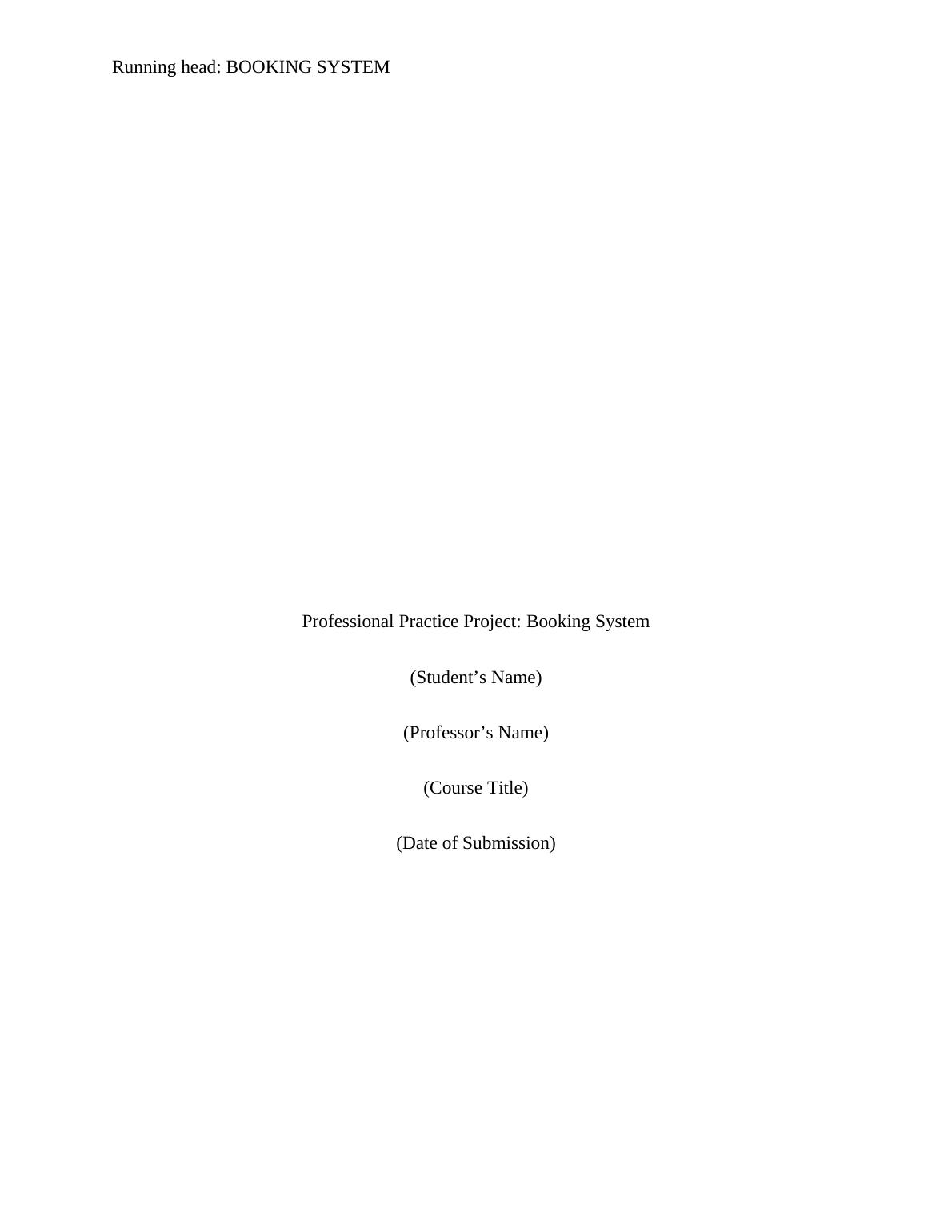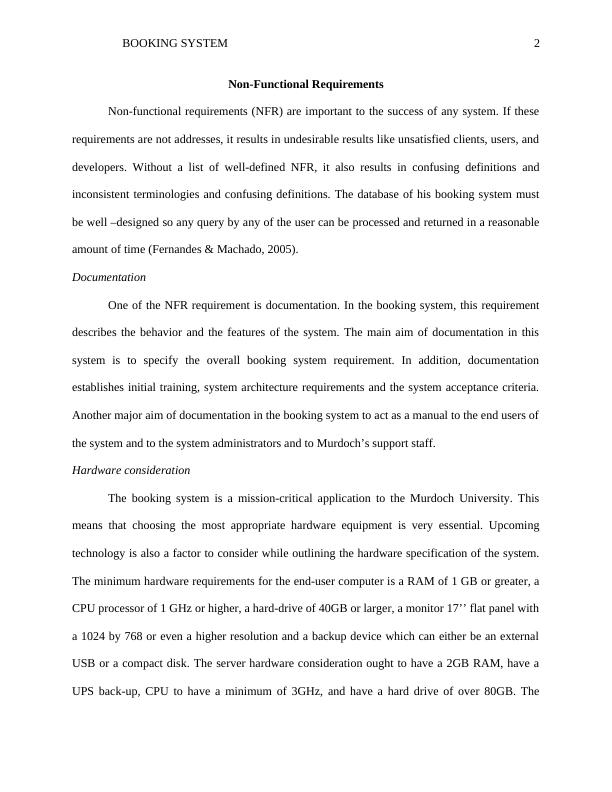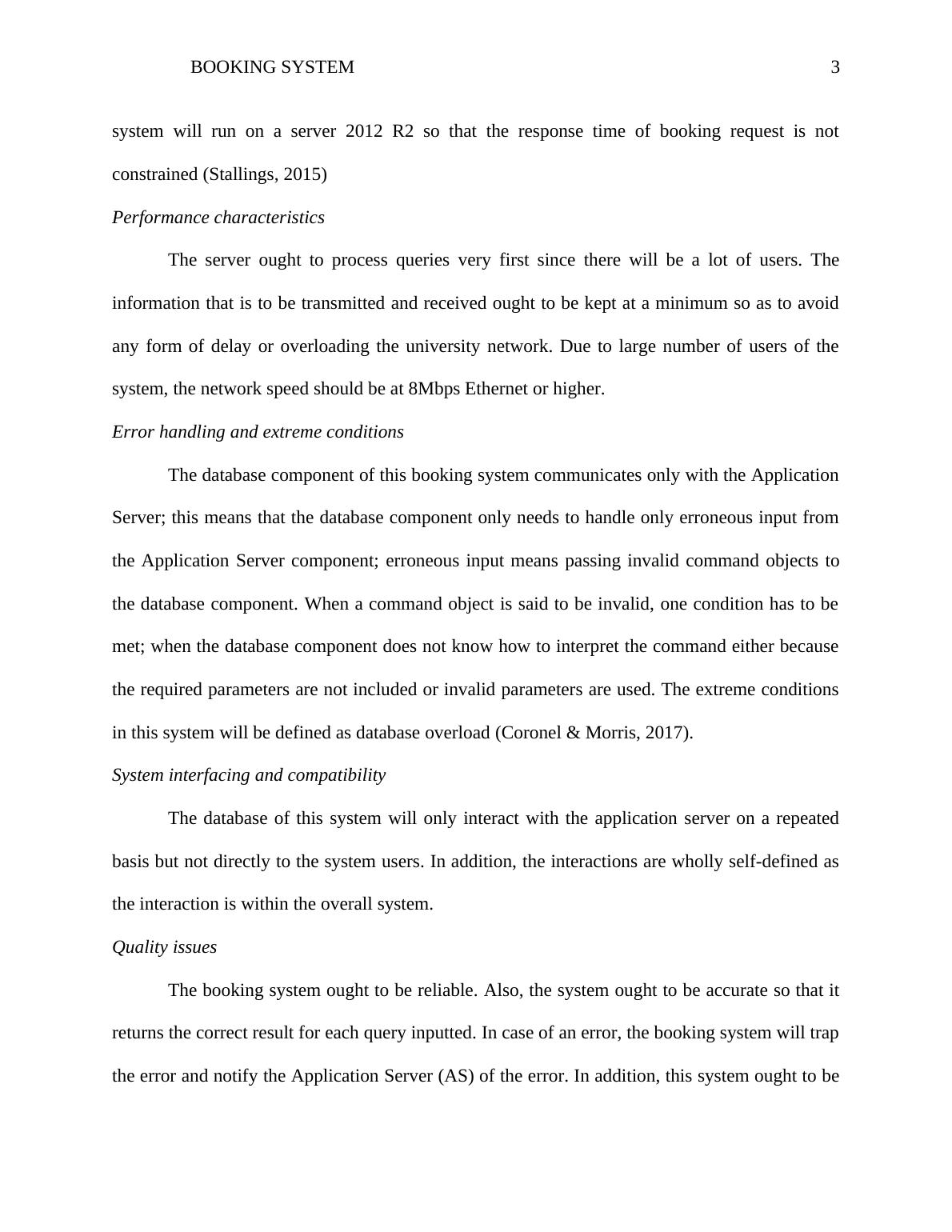Professional Practice Project: Booking System
Added on 2023-06-04
7 Pages1591 Words112 Views
Running head: BOOKING SYSTEM
Professional Practice Project: Booking System
(Student’s Name)
(Professor’s Name)
(Course Title)
(Date of Submission)
Professional Practice Project: Booking System
(Student’s Name)
(Professor’s Name)
(Course Title)
(Date of Submission)

BOOKING SYSTEM 2
Non-Functional Requirements
Non-functional requirements (NFR) are important to the success of any system. If these
requirements are not addresses, it results in undesirable results like unsatisfied clients, users, and
developers. Without a list of well-defined NFR, it also results in confusing definitions and
inconsistent terminologies and confusing definitions. The database of his booking system must
be well –designed so any query by any of the user can be processed and returned in a reasonable
amount of time (Fernandes & Machado, 2005).
Documentation
One of the NFR requirement is documentation. In the booking system, this requirement
describes the behavior and the features of the system. The main aim of documentation in this
system is to specify the overall booking system requirement. In addition, documentation
establishes initial training, system architecture requirements and the system acceptance criteria.
Another major aim of documentation in the booking system to act as a manual to the end users of
the system and to the system administrators and to Murdoch’s support staff.
Hardware consideration
The booking system is a mission-critical application to the Murdoch University. This
means that choosing the most appropriate hardware equipment is very essential. Upcoming
technology is also a factor to consider while outlining the hardware specification of the system.
The minimum hardware requirements for the end-user computer is a RAM of 1 GB or greater, a
CPU processor of 1 GHz or higher, a hard-drive of 40GB or larger, a monitor 17’’ flat panel with
a 1024 by 768 or even a higher resolution and a backup device which can either be an external
USB or a compact disk. The server hardware consideration ought to have a 2GB RAM, have a
UPS back-up, CPU to have a minimum of 3GHz, and have a hard drive of over 80GB. The
Non-Functional Requirements
Non-functional requirements (NFR) are important to the success of any system. If these
requirements are not addresses, it results in undesirable results like unsatisfied clients, users, and
developers. Without a list of well-defined NFR, it also results in confusing definitions and
inconsistent terminologies and confusing definitions. The database of his booking system must
be well –designed so any query by any of the user can be processed and returned in a reasonable
amount of time (Fernandes & Machado, 2005).
Documentation
One of the NFR requirement is documentation. In the booking system, this requirement
describes the behavior and the features of the system. The main aim of documentation in this
system is to specify the overall booking system requirement. In addition, documentation
establishes initial training, system architecture requirements and the system acceptance criteria.
Another major aim of documentation in the booking system to act as a manual to the end users of
the system and to the system administrators and to Murdoch’s support staff.
Hardware consideration
The booking system is a mission-critical application to the Murdoch University. This
means that choosing the most appropriate hardware equipment is very essential. Upcoming
technology is also a factor to consider while outlining the hardware specification of the system.
The minimum hardware requirements for the end-user computer is a RAM of 1 GB or greater, a
CPU processor of 1 GHz or higher, a hard-drive of 40GB or larger, a monitor 17’’ flat panel with
a 1024 by 768 or even a higher resolution and a backup device which can either be an external
USB or a compact disk. The server hardware consideration ought to have a 2GB RAM, have a
UPS back-up, CPU to have a minimum of 3GHz, and have a hard drive of over 80GB. The

BOOKING SYSTEM 3
system will run on a server 2012 R2 so that the response time of booking request is not
constrained (Stallings, 2015)
Performance characteristics
The server ought to process queries very first since there will be a lot of users. The
information that is to be transmitted and received ought to be kept at a minimum so as to avoid
any form of delay or overloading the university network. Due to large number of users of the
system, the network speed should be at 8Mbps Ethernet or higher.
Error handling and extreme conditions
The database component of this booking system communicates only with the Application
Server; this means that the database component only needs to handle only erroneous input from
the Application Server component; erroneous input means passing invalid command objects to
the database component. When a command object is said to be invalid, one condition has to be
met; when the database component does not know how to interpret the command either because
the required parameters are not included or invalid parameters are used. The extreme conditions
in this system will be defined as database overload (Coronel & Morris, 2017).
System interfacing and compatibility
The database of this system will only interact with the application server on a repeated
basis but not directly to the system users. In addition, the interactions are wholly self-defined as
the interaction is within the overall system.
Quality issues
The booking system ought to be reliable. Also, the system ought to be accurate so that it
returns the correct result for each query inputted. In case of an error, the booking system will trap
the error and notify the Application Server (AS) of the error. In addition, this system ought to be
system will run on a server 2012 R2 so that the response time of booking request is not
constrained (Stallings, 2015)
Performance characteristics
The server ought to process queries very first since there will be a lot of users. The
information that is to be transmitted and received ought to be kept at a minimum so as to avoid
any form of delay or overloading the university network. Due to large number of users of the
system, the network speed should be at 8Mbps Ethernet or higher.
Error handling and extreme conditions
The database component of this booking system communicates only with the Application
Server; this means that the database component only needs to handle only erroneous input from
the Application Server component; erroneous input means passing invalid command objects to
the database component. When a command object is said to be invalid, one condition has to be
met; when the database component does not know how to interpret the command either because
the required parameters are not included or invalid parameters are used. The extreme conditions
in this system will be defined as database overload (Coronel & Morris, 2017).
System interfacing and compatibility
The database of this system will only interact with the application server on a repeated
basis but not directly to the system users. In addition, the interactions are wholly self-defined as
the interaction is within the overall system.
Quality issues
The booking system ought to be reliable. Also, the system ought to be accurate so that it
returns the correct result for each query inputted. In case of an error, the booking system will trap
the error and notify the Application Server (AS) of the error. In addition, this system ought to be

End of preview
Want to access all the pages? Upload your documents or become a member.
